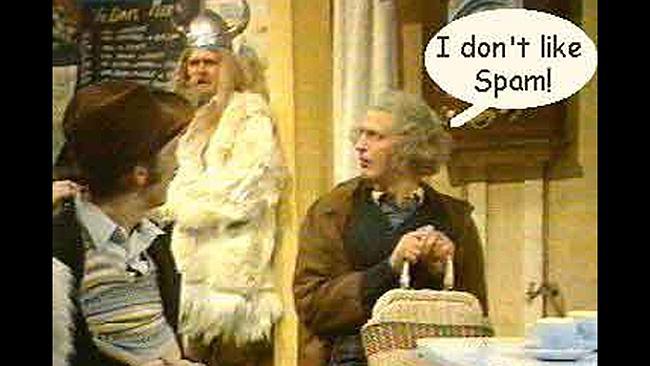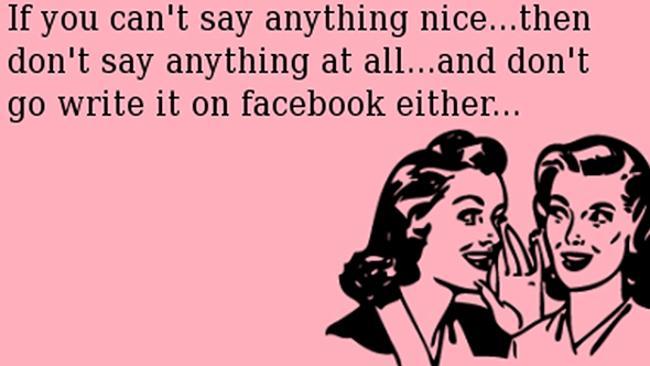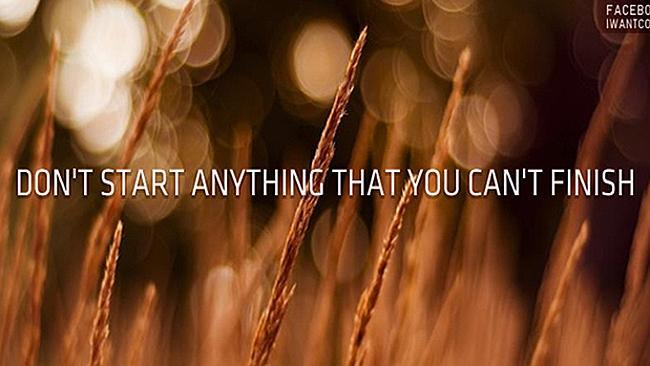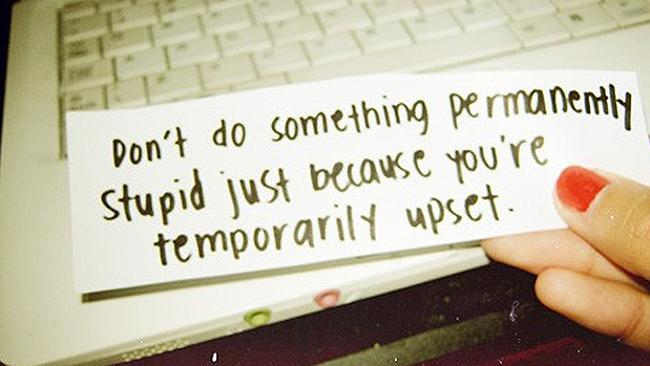16 ways to be a better internet citizen
THE internet is an amazing place, but sometimes it's easy to get carried away. Here is how you can be a better internet citizen.

Gadgets
Don't miss out on the headlines from Gadgets. Followed categories will be added to My News.
WE'RE fast heading towards the year's end, a time where resolutions are made and quickly broken.
Some people might vow to lose weight, others to stop drinking so damn much. Me, I'm thinking about ways to be a better internet citizen.
I'm one of the biggest offenders when it comes to being reactive online. It's nice to have a place online to vent, but that doesn't come without its consequences.
I've resolved to eliminate some of my bad internet habits. I thought I might share some of them with you:
1. Stop tech-shaming people

So some stranger on the internet uses an Apple phone but you're a hardcore Android fan. Leave them alone.
The gadgets people use are part of their identity. How would you like it if I came to your house and criticised your dog? People feel the same way about their gadgets.
Liking a particular brand doesn't make you right and other people wrong, or vice versa.
It's a personal choice.
Don't let brands recruit you to their PR army. Besides, you just come across as hostile and arrogant. (Luke Hopewell has written a detailed manifesto on this very topic. I highly recommend you check it out).
2. Find a cause you believe in, promote it
Whether it's a Kickstarter campaign or a charity, find something you can believe in, something that helps people, something that brings joy to others, and get behind it.
But be careful not to bombard people on your friends list. Which brings us to #3.
3. Stop the spam

It's great to have a cause you believe in, a cause that you want to promote, but moderation is key.
Spamming people with your umpteen causes isn't going to earn you more followers, in fact it might lose you some.
Devote the next few months to figuring out ways to promote your charity/Kickstarter/other cause of choice without losing friends and alienating people.
4. Take stock of your behaviour

It's ok to be a little self loathing, so long as it's channelled productively. I find it's a good idea to read back over your tweets/Facebook and blog posts and look objectively at how you come across.
Posts you may have thought were funny at the time may now make you cringe.
Naturally, delete anything that might cost you your job, or detract potential future employers.
Think about how you come across to people. If there are things you don't like, be brave, make a list and analyse what it is about your past posts that make you uncomfortable. Then find a way to change them.
A little self-analysis never goes astray.
5. If you can't say something nice don't say anything

Make a promise with yourself that from now until the end of the year not to post anything that isn't informative or doesn't make people happy.
Resist the urge to reply to dickheads. Don't give in to the instinct to tell your politician he's a moron on Twitter.
If we can all devote ourselves to filling the interwebs with positive content - if only for a few months - we can change the entire tone of our networks for the better.
6. Explore other worlds

One of the great virtues of the web is that it opens up spaces we may not have the time or money to travel to. But with Facebook, Twitter and Instagram, it's easy to insulate yourself within your own social circle or professional network.
Spend a day each week away from social networks and instead explore Google maps.
Zoom out, close your eyes, click on any place on earth, zoom in and explore. Street view lets you walk down rocky pathways in the Apalacias or drive down the road Hunter S Thompson drove through on his way out of Las Vegas.
Then go to WikiPedia and find out about the area you've clicked on. Read about the culture, the people there, find out what its problems are. Is there something you can do to help? Is there great art coming out of the region? Is there an uprising? Support its local writers, or comedians, or celebrities. You could even contact them if you want.
Use the time to look outside of yourself and your world and explore the worlds of others. Go to places you've never been before and put yourself in other people's digital shoes for a day.
I guarantee it'll be a worthwhile experience.
7. Spend some time away from comments
Too much time spent reading comments can be bad for your health. Spend some time away from them.
Set yourself a challenge to read a news stories in full, then click on to the next one.
Figure out how you feel about any given topic without the power of the crowd. You might find you surprise yourself.
8. Devote yourself to finishing stuff

There's so much stuff on the internet, it's easy to accumulate a list of things that you promise yourself you'll read, but never quite end up finishing.
Read one good long read a day. Find an excellent feature, read it in full.
Whether it's fiction or non fiction, news or tabloid - commit yourself to fully absorbing the entire text before moving on to the Next Shiny Thing. Finish that blog you wrote at midnight on your phone. Sit down and write that email to your cousin overseas. Edit those photos that have been sitting in your Photoshop queue for months. Get through that podcast.
Slow down. The internet isn't going anywhere.
9. Substitute arguments with investigation

Is there an issue getting on your nerves? Why not investigate it instead of tweeting hostile posts about why other people aren't paying attention to it.
Make people pay attention. Find out stuff, write it down, record it. Put it in some logical order. Make people care.
You not only get to learn stuff and talk to new people, you get to do some good too.
If you get bogged down, ask questions. Use Quora or Twitter. The internet is here to help, if you let it. Collaborate.
I guarantee it'll be a rewarding experience.
10. Learn to distinguish constructive criticism and douchebaggery
Peer review is one of the greatest virtues and greatest evils of the internet.
The hostility of the internet can almost be enough to discourage anyone from ever creating anything ever again.
It's so easy to be guided by the views of others, but the hard part is being able to absorb constructive criticism while dismissing the bullshit.
Don't let the internet get you down. Create great work and let your peers help you make it better.
Figure out who you respect. Read everything they have ever written, or watch or listen to everything they've ever recorded. Figure out who you don't respect and, again, read everything they've written or created. Analyse what it is that makes you dislike them. Cross reference them against everyone who has criticised your work and assign them into one of two camps: helpful, and the rest. Dismiss the rest.
Use peer review to make you a better anything: writer, artist, video blogger, graphic designer, person, photographer, programmer, builder, businessperson, analyst.
The crowd is only as useful as you let it be.
11. Watch TED videos
TED talks are one of the most constructive ways to learn stuff you have no idea about. Let them be a starting point for your internet travels. Get lost in a YouTube spiral of constructive information. Feel smarter for it.
12. Indulge yourself
Trust your obsessions. Fan fiction? Animal videos? Deviant Art? Web comics? Video blogging? Indulge in the things you love and enjoy them fully and with abandon.
13. Find something worth buying

Been pirating all year? Find a series or music or film worth investing in and buy it. While you're at it, buy your friends and family a copy for Christmas too. Pay it forward. Invest in the kind of things you want to see more of and give something back so they can keep on making good things for you to consume while also being able to pay the rent.
14. Learn what an audience is

Not everything on the web is made with you in mind. That doesn't make its value intrinsically worthless. It just means you're not the demographic. Learn that different websites have different audiences and if you don't like something, move on to find something you do like.
15. Make the internet better, stop hate-reading

Hate-reading has become an economy of itself on the web. Stories are written deliberately to rile people up, hoping it'll be shared and hated across social networks. Don't take the bait.
If you absolutely must click on a hate-read, make up for it by giving your click to something worthwhile. You can change the value of content by resisting the urge to read things that only make you an angrier, more hateful person.
16. Write a fan letter

Write that fan letter to George R.R. Martin. Tweet that writer whose article you enjoyed. Try to spend more time putting stuff out into cyberspace on the things you like.
Hell, thank someone you follow for being awesome, or one of your followers for being even awesomer. They don't have to be famous, you don't have to know them. Gratitude is an undervalued currency. The more you use it the more valuable it will become. The best punishment for the crap you hate is to ignore it.


